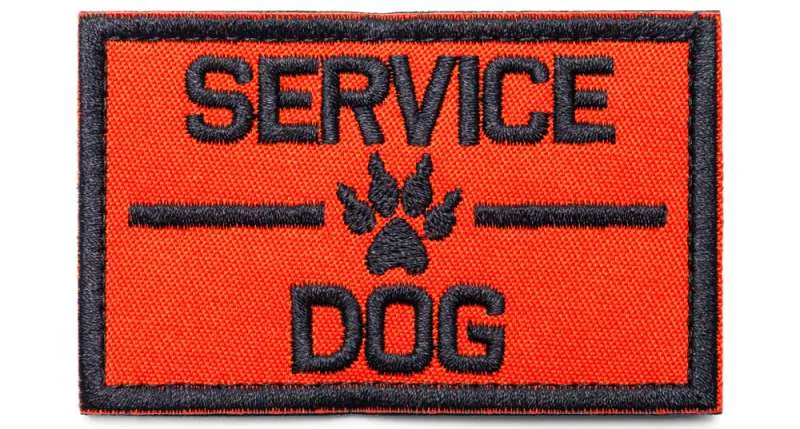A dog is a man’s best friend – we’ve all heard of this saying, and every dog owner knows it’s true. Whether it’s through keeping us company, getting us to be more physically active or teaching us what unconditional love really is, dogs are of service to us in so many ways.
But, there is another way for our furry friends to help us through life – by being our service dogs.
So, if you have a reason that might warrant you getting a service dog and you just so happen to love Corgis, it’s completely logical that you pose the question “Are Corgis Good Service Dogs?”.
That’s why I’m here to tell you that Corgis can be a good choice for a service dog, but only in certain situations.
So, if you want to learn more about all the reasons Corgis should and should not be used as service dogs, keep on reading!

What Is A Service Dog?
The term service dog has been getting a lot more attention lately. A day doesn’t go by that we don’t see a wholesome video of a service dog helping its human.
But, do we really know what being a service dog means for our puppers?
According to the Americans with Disabilities Act, a service dog is “a dog that is individually trained to do work or perform tasks for a person with disabilities”. The task or work that they do is directly related to their owner’s disability.
These tasks that a service dog performs can widely vary and according to that, we have different kinds of service dogs:

Guide Dogs
Guide dogs are service dogs which help blind or visually impaired people move about while leading them around obstacles. The training for guide dogs usually includes learning to:
- Walk centrally along the sidewalk while avoiding obstacles ahead
- Not turn corners without being told to do so
- Help their owner to keep straight when crossing a street
- Find doors and crossings
- Other skills
The important thing to note is that the owner is the one giving commands and navigating, while the dog is helping them along the way – it’s a partnership!
Diabeic Alert Dogs
Diabetic Alert Dogs are trained to help owners who have diabetes. They are primarily trained to detect and alert their owner when a hypoglycemic or hyperglycemic attack is about to happen. They are able to do this by smelling different scents that the human body emits during such episodes.
Aside from alerting of an incoming hypoglycemic or hyperglycemic attack, Diabetic Alert Dogs can provide an immense amount of emotional support to their owners, which is crucial for someone struggling with diabetes.

Psychiatric Service Dogs
Psychiatric Service Dogs are service animals which are trained to help people with mental illnesses and disorders. These cover a wide range of disorders: anxiety, depression, post-traumatic stress disorder (PTSD), bipolar disorder, schizophrenia and so on.
Their training and the skills they will learn during it depend on the type of mental disorder their owner has, as well as what their needs regarding it are. They usually include assistance with tasks their owners would not be able to do without the help of their service dog.
You should not confuse Psychiatric Service Dogs with Emotional Support Dogs, which are trained to provide comfort to their owners by just being present.
Mobility Assistance Dogs
Mobility Assistance Dogs help their owners who have some kind of disability which affects their mobility (spinal cord injuries, cerebral palsy, muscular dystrophy and so on). They help with doing everyday tasks that their owners wouldn’t be able to perform otherwise, as a result of their disability.
Hearing Dogs
Hearing dogs assist deaf and hard-of-hearing people. The way they work is by alerting their owner of a particular cue in the form of a noise, and leading them to it. The cues can include fire alarms, doorbells, alarm clocks, knocking, their persons name and so on.
The way they contribute to their owner’s life is by increasing their independence regardless of where they are (at home or elsewhere).

Corgis As Service Dogs
Now that we know some types of assistance that service dogs can offer, we can get to the meat of the article – are Corgis fit to be service dogs?
There are many factors that contribute to a breed being suitable or unsuitable for the task of servicing their owner. Temperament and nature, intelligence, size and strength, as the most important, will be our focus here.

Temperament And Nature
Even though we see Corgis as house pets and our cuddly balls of fur, they were bred as herding dogs, which means they are a working breed. They thrive when they are given some sort of a task and when they feel useful to their humans.
This means that they will love going through training and then helping you with the skills they have acquired during that process. They are also extremely loyal pets which means that they will be there for you through thick and thin, and even more so when they are trained to act on their instincts more actively.
Intelligence
Corgis are one of the most intelligent dog breeds out there (ranked 11th). Because of their herding nature, they are incredibly quick learners which makes them ideal for this type of training.
What also goes in favour of their being suitable for the position of a service dog is the fact that (again, because of their herding background) they are great at improvisation and critical thinking, making them great in emergency situations.
They have shown to be able to respond to the first command about 85% of the time, which is pretty high. What you will need to be careful with though, is the fact that your Corgi’s temperament also includes independence and a strong will. This, paired with their high intelligence can sometimes cause more problems than it can solve.
This means that, even though they want to work for you and know what you are asking them to do, they might decide not to obey.

Size And Strength
Even though it might not be that obvious, size can play a huge role in choosing a service dog.
Although it isn’t important for all types of service, for some, it’s crucial. These include mobility assistance dogs, psychiatric service dogs, seizure alert dogs and so on.
In situations in which these dogs assist their owners, it’s sometimes necessary for them to physically help their owners by moving them, bracing them, using deep pressure simulation, etc.
For these reasons, it’s not very practical that a small dog, such as a Corgi, be used for these types of assistance.
The Final Verdict
With all this information at hand, it still might not be clear whether Corgis are a good choice for a service dog. There are characteristics that speak in favour, as well as those that speak against it.
So, what is it, then?
The truth is that there are certain kinds of services that Corgis are better at performing than others. While most of these services will probably be done better by some other breeds, there are still some that Corgis can be a good fit for.
Many organizations that deal with service dog training have moved on from using and training Corgis for assistance in most situations. However, there are a few disabilities that Corgis can be wonderful at and are still used for.
One of those situations is their assistance to deaf or hard-of-hearing owners – as hearing dogs. We’ve briefly touched on what this entails, so it’s pretty clear as to why Corgis are a good fit here. One of the main reasons is because these situations don’t include the need for physical strength or require a certain size, while still being able to utilize their intelligence and work ethic.

Conclusion
You came to this article wondering “Are Corgis good service dogs?”, and hopefully now, you have acquired the necessary knowledge. To make things easier for you to memorize, here is a quick summary of everything we have gone over.
A service dog’s job is to help their owner who has a disability live their life a bit easier and more independently. There are many different kinds of service and assistance dogs, according to the disabilities of their owner (seizure dogs, psychiatric dogs, guide dogs, hearing dogs, mobility assistance dogs, etc.)
When it comes to Corgis and their eligibility as a service dog, there are many factors you should take into account when deciding. While their intelligence and herding background make them a great candidate for learning and doing work, they are also incredibly strong-minded and independent.
This means that in combination, these traits can easily backfire and make them less obedient and not the greatest candidate for a service dog.
On the other hand, if the service you’ll need from your dog is one that fits their personality and physical characteristics best (hearing dog, for example), a Corgi can definitely be the right choice for you. So, since you have learned the necessary information on this topic, I’ll let you get to making this very important decision.
However, keep in mind that in situations like these, how cute a dog is, shouldn’t really be a factor in deciding, but rather their capability to do their job well. Now, get to deciding and good luck in finding your furry service partner!

